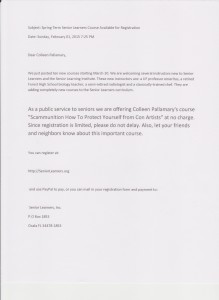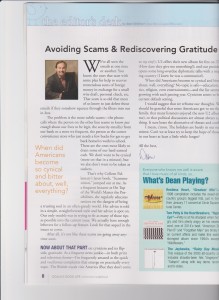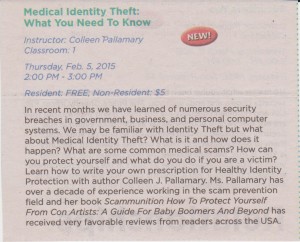Author Archives: Colleen
Thanks to Ocala’s Good Life Magazine For Their Support
Upcoming Medical Identity Theft Presentation
Upcoming Classes at Master The Possibilities
Happy New Year Cover Story 2015!
 Grateful to Ocala The Good Life Magazine for featuring Scammunition as their cover story! Here’s how to take a peek! http://bit.ly/1D7vHd6
Grateful to Ocala The Good Life Magazine for featuring Scammunition as their cover story! Here’s how to take a peek! http://bit.ly/1D7vHd6
Debut Novel The Vampire Preservation Society Released
 http://www.prweb.com/releases/TheVampirePreservation/Society/prweb12393302.htm
http://www.prweb.com/releases/TheVampirePreservation/Society/prweb12393302.htm
Available on Amazon.com !
Puppies, Pizza, and PayPal – Holiday Tips and Tails
It’s that time of year again when deals and steals work hand in hand. Online shopping is a breeze but consumers need to steer clear of pet scams, infected pizza, and phony payment plans. Here’s a look at some of the latest themes and schemes that will have buyers saying “No! No! No!” instead of “Ho! Ho! Ho!”
Warm fuzzy puppies can make a great gift for responsible pet lovers. Unfortunately, devious scammers use pictures of non-existent animals as a ploy to lure unsuspecting buyers into deals that deplete funds and causes heartache when the promised pet doesn’t appear. Never purchase a pet sight unseen and be leery of requests for additional charges for shipping, insurance, and unsubstantiated vet fees. Check out the facility where the dogs are kept and contact the American Kennel Club if purchasing a purebred dog. Be cautious of any deal that sounds too good to be true.
Pizza is the go-to choice for many families during the hectic holidays. Recently people in several states have received emailed coupons offering free pizza from Pizza Hut in honor of their “55th Anniversary” and the offer really is too good to be true. The coupon contains malware and if downloaded will cause damage to your computer system. Before clicking on the offer look at the sender’s address. Is it from Pizza Hut? Does hovering over the coupon show pizzahut.com? Did you find the email in your junk folder? Is Pizza Hut advertising the special deal on their website? If in doubt, toss it out!
PayPal is a convenient way for sellers and buyers to conduct payment transactions online. Scammers often “spoof” (impersonate) legitimate business sites in an effort to get your personal information and PayPal is not immune. Beware of generic greetings in emails listing PayPal as the sender. PayPal addresses each email with the full first and last names of their customers or the actual business name. They do not send attachments nor do they request bank account numbers, Social Security numbers, or passwords. If you suspect any suspicious activity on your account visit www.paypal.com or call 1-888-221-1161. Forward questionable emails to spoof@paypal.com.
It seems each year we need to learn something new in order to protect ourselves and loved ones from fraud. Please share what you know with others. Safety is a great gift and it’s free!
HAPPY HOLIDAYS & HAPPY NEW YEAR!
Ebola Scams
As we all know Ebola has been in the headlines for several weeks. Scammers wasted no time in devising deceptive schemes to capitalize on people’s fears and concerns. Here are some of the latest ploys making their way around various media outlets.
Numerous ads for supplements claiming to cure and/or prevent Ebola are popping up everywhere. There are even Ebola Prevention kits for sale which include gas masks and other equipment. designed to prevent an outbreak. Before ordering or taking any “Ebola miracle cure” supplements check with your health care professional and visit the FDA at www.fda.gov or call 1-888-463-6332 for additional information.
Scammers thrive on setting up fake charities whenever a disaster or incident requires financial help. No matter what the issue is, never give out your personal information online or on the phone. Before giving your hard earned money to a charity or cause check them out at www.charitynavigator.org or www.give.org . Your local BBB can also help. If you believe you’ve been victimized by a fraudulent charity or scheme contact the FTC at www.ftc.gov or call them at 1-877-382-4357.
It is always difficult to separate fact from fiction when dealing with serious issues such as Ebola. For updates and information please visit the CDC at www.cdc.gov or call 1-800-232-4636.
Please remember to check back for upcoming news and events. Thank you for your support! Happy Holidays!
Halloween Tips: Click or Treat?
 As autumn approaches hackers and scammers continue to slither in cyberspace concocting unlikely tales and promising riches fit for kings and queens. Hiding behind masks of anonymity they embed malware and viruses inside seemingly harmless posts and unsuspecting users become entangled in complex webs of deceit by pushing a single button.
As autumn approaches hackers and scammers continue to slither in cyberspace concocting unlikely tales and promising riches fit for kings and queens. Hiding behind masks of anonymity they embed malware and viruses inside seemingly harmless posts and unsuspecting users become entangled in complex webs of deceit by pushing a single button.
Here’s a few tips on how to avoid scary clicks and cheats:
If shopping online for costumes and holiday gear, be sure the URL is spelled correctly and look for HTTPS (not HTTP) and a padlock icon in the address bar before entering payment info. The “S” (secure) combined with the padlock indicates your information is safe.
When visiting Facebook do not click on any links that promise a chance to win a new iPhone 6, a dream vacation, a new car etc. Clicking on phony links redirects your personal information to hackers intent on using it for their own personal gain.
Never give out personal information on social media and ignore any emails or requests that demand your account information and/or password info. Your money will vanish and so will the cons. Report any issues to actual vendors when applicable and check your bills regularly for any unauthorized charges.
New scams and variations of old ones creep up this time of year like goblins on Halloween. Make-believe is fun but threats to your security are real. Be safe and don’t let your click become a treat for the greedy monsters hiding in their invisible worlds.
When USBs Become UFOs (Unidentified Fraud Objects)!
We’re all familiar with the small storage devices called thumb drives, flash drives, or memory sticks. A tiny circuit board holds vast amounts of information that we are able to share and retrieve within seconds and the added ease of portability is a plus when working on different devices. We all take safety precautions on our personal electronic devices and need to take it a step further when using flash drives.
Many drives are preprogrammed by manufacturers to contain certain information. As users we have the ability to store whatever we want and therein lies the problem. Hackers use their own flash drives to install invasive and infected software on our computers and our accounts and personal information are compromised in seconds with the click of a button and a smile. By the time we find out, it may be too late to repair the damage. Here’s some tips to prevent a UFO attack:
Never let a stranger use your computer. In addition to invasive programs that may be stored on their flash drives , malware, spyware, and other viral programs can be downloaded directly onto your hard drive. The saying “stranger danger” applies to electronics too!
Use only reputable services for repairs.
Keep your anti-virus programs up to date and schedule regular scans. Free anti-virus programs provide some protection, but remember, if it’s free to you, it’s free to hackers, too, and they can easily figure out ways to work within those programs as well.
Using USBS can be as easy as 1-2-3 and fraud awareness is totally free! Think twice before allowing anyone access to your devices and data and always PYA (Protect Your Assets)!





